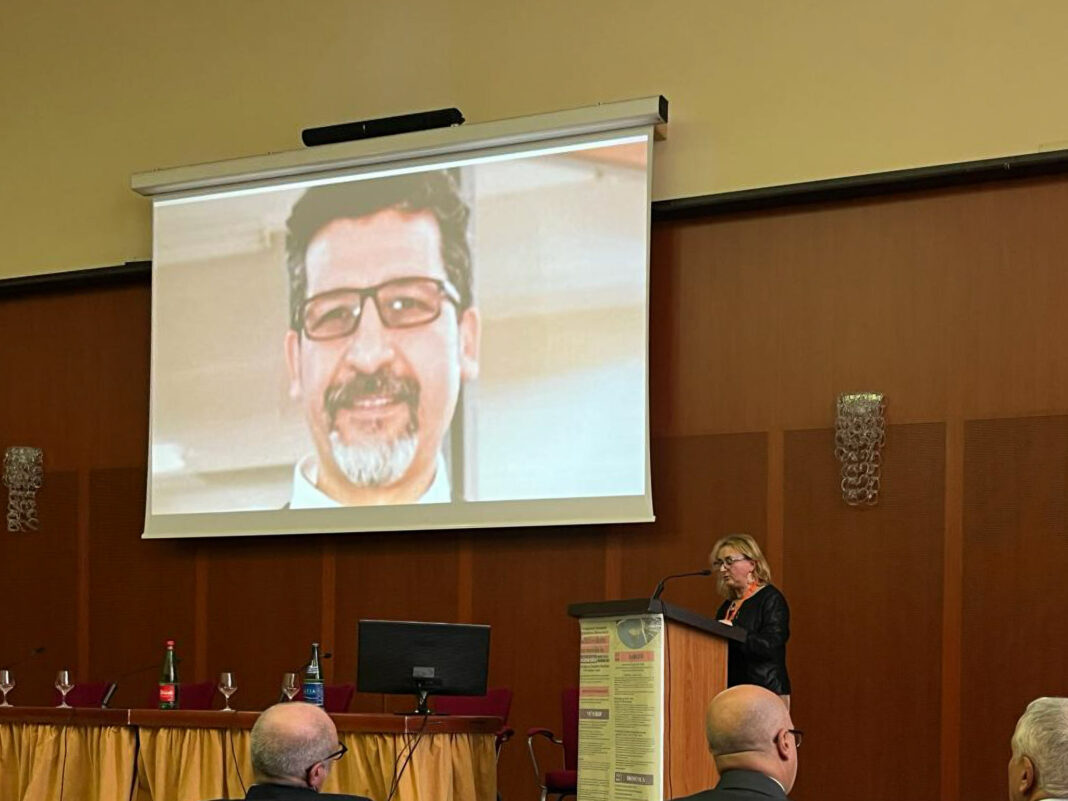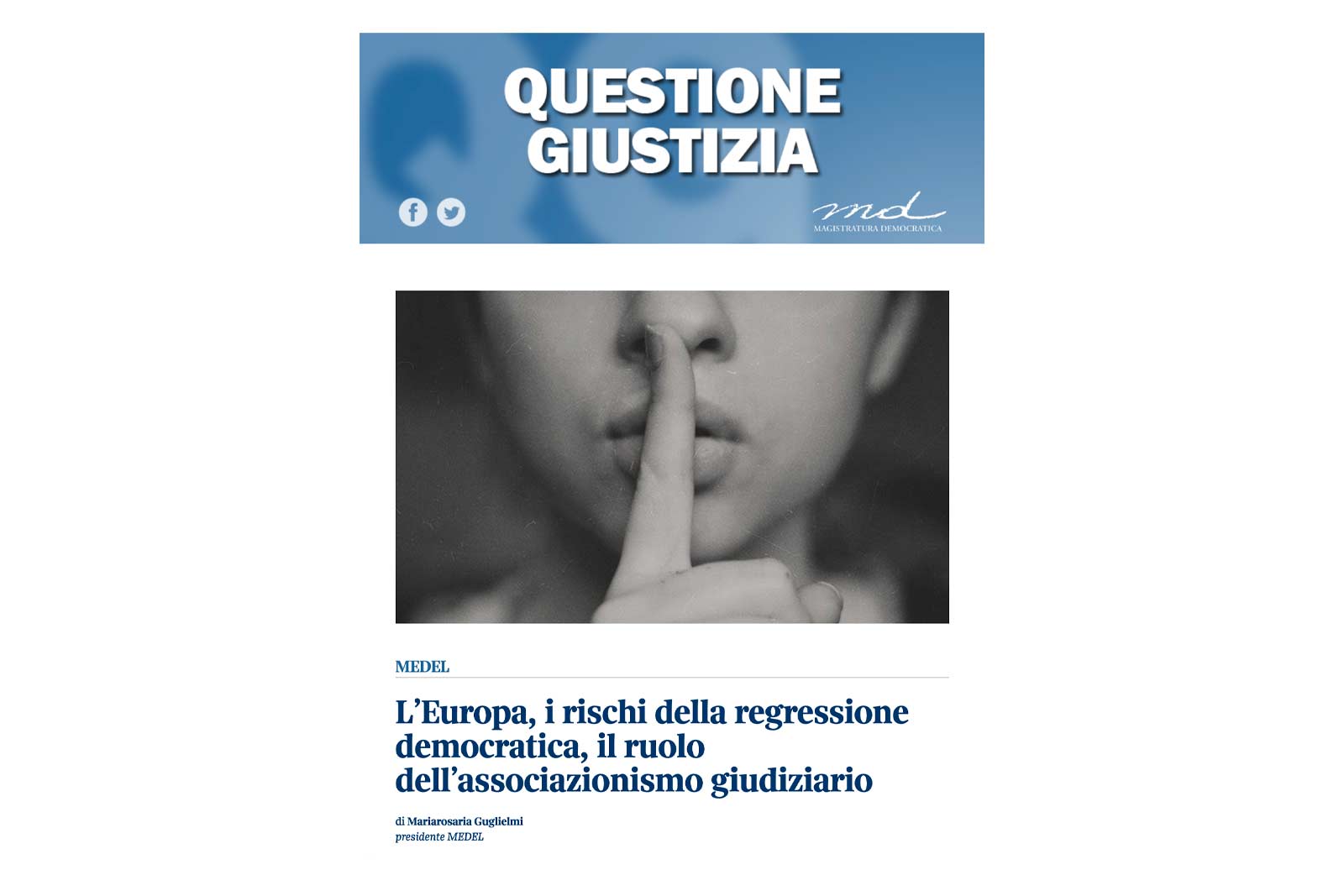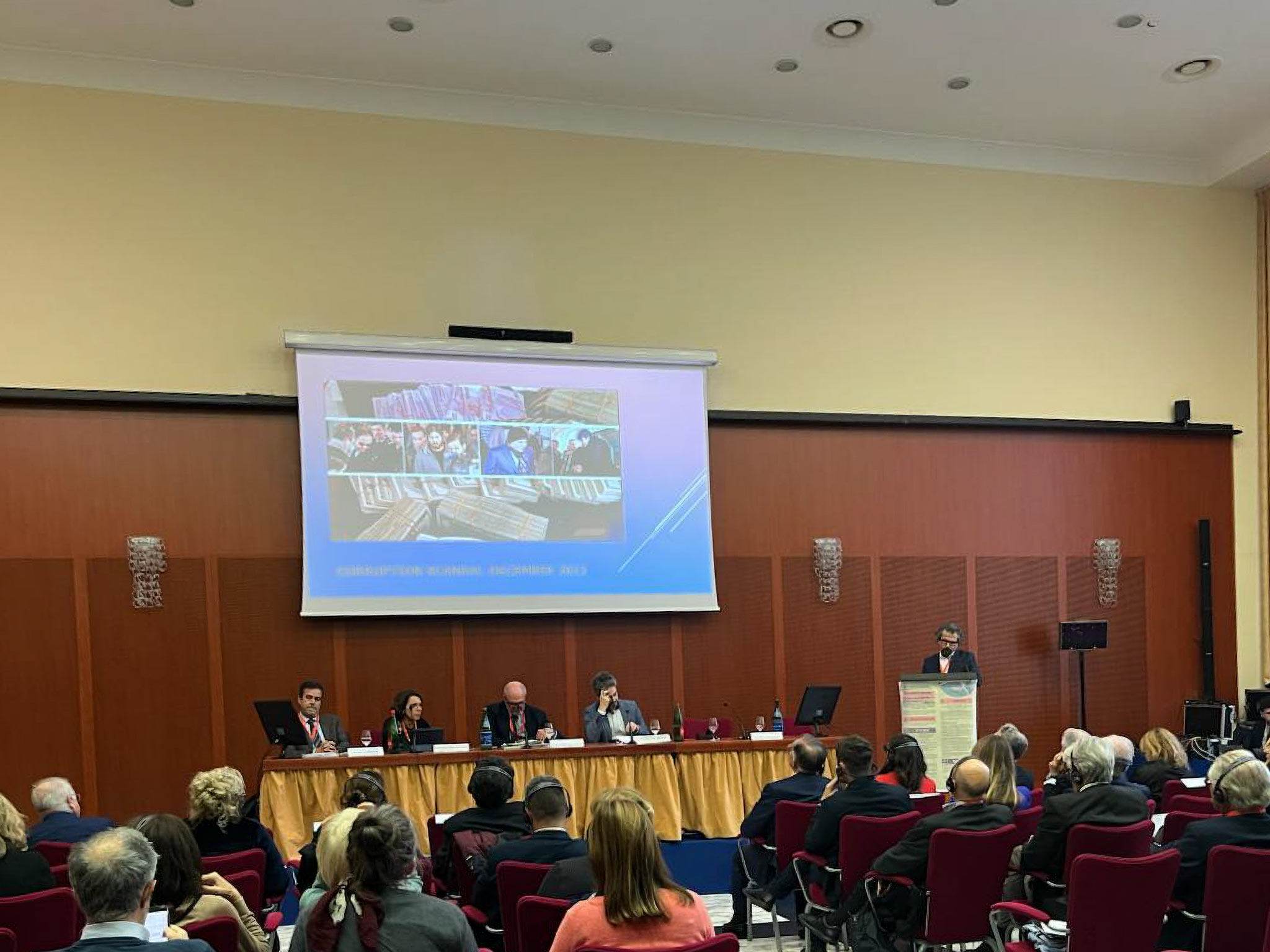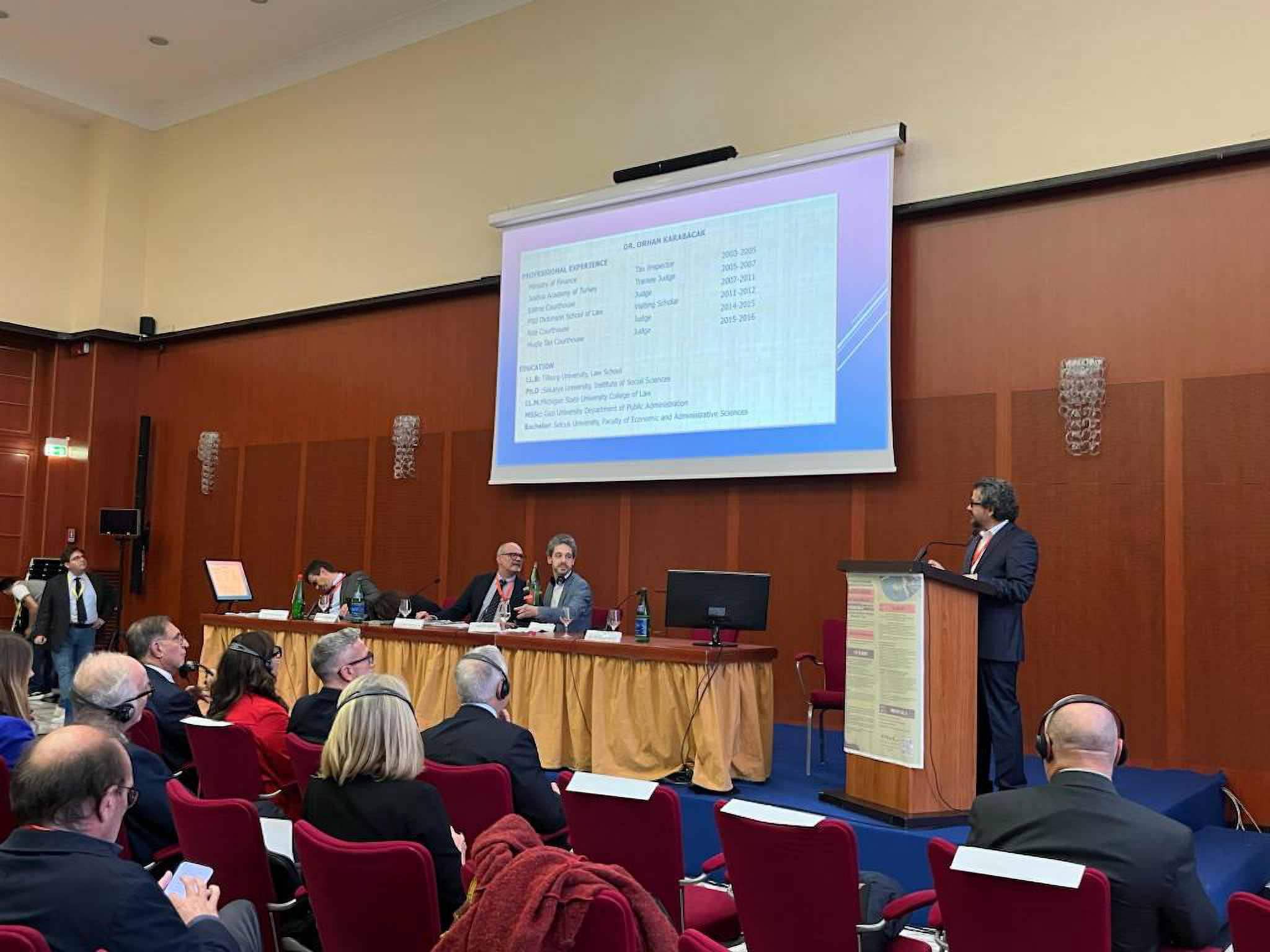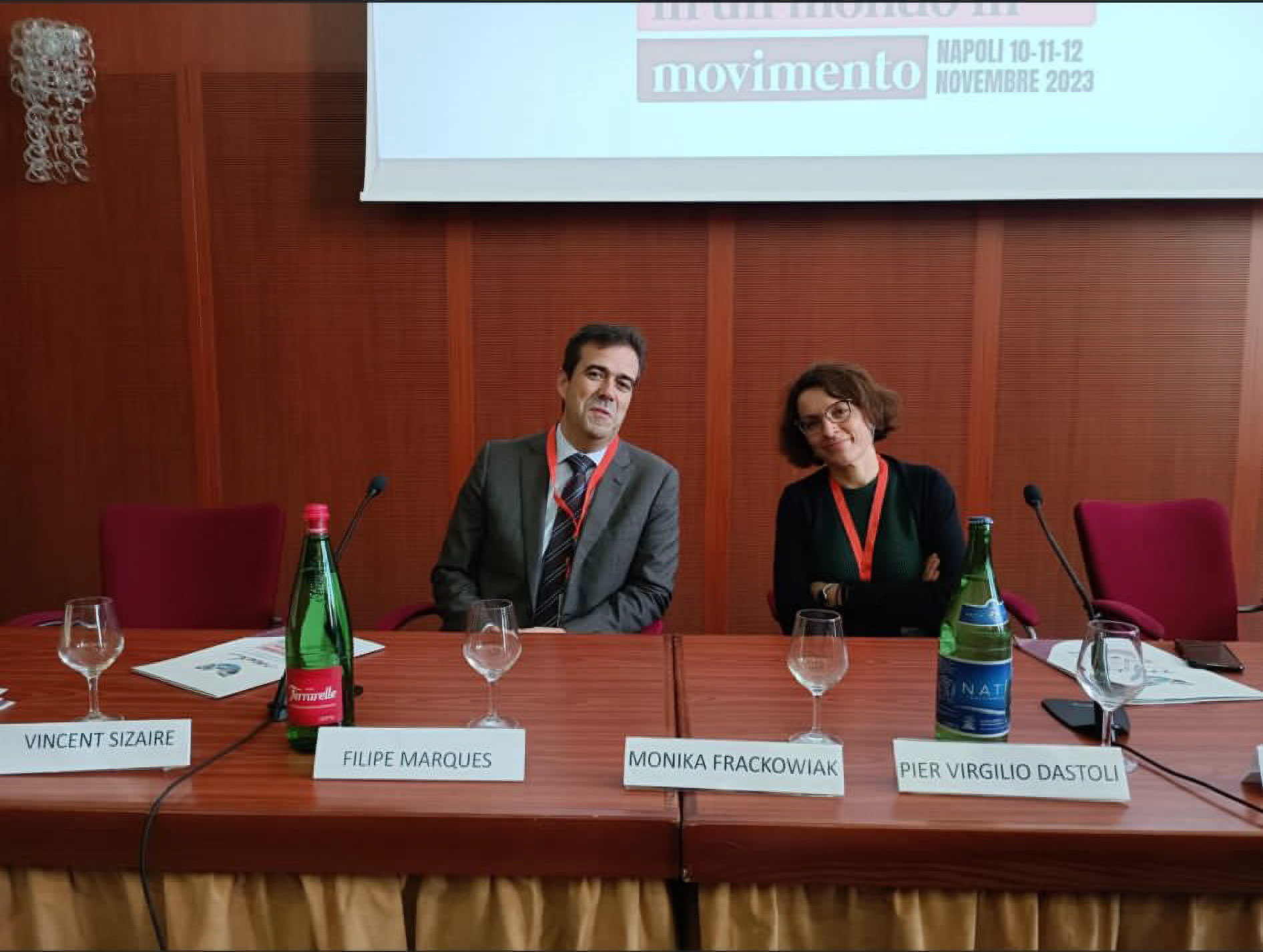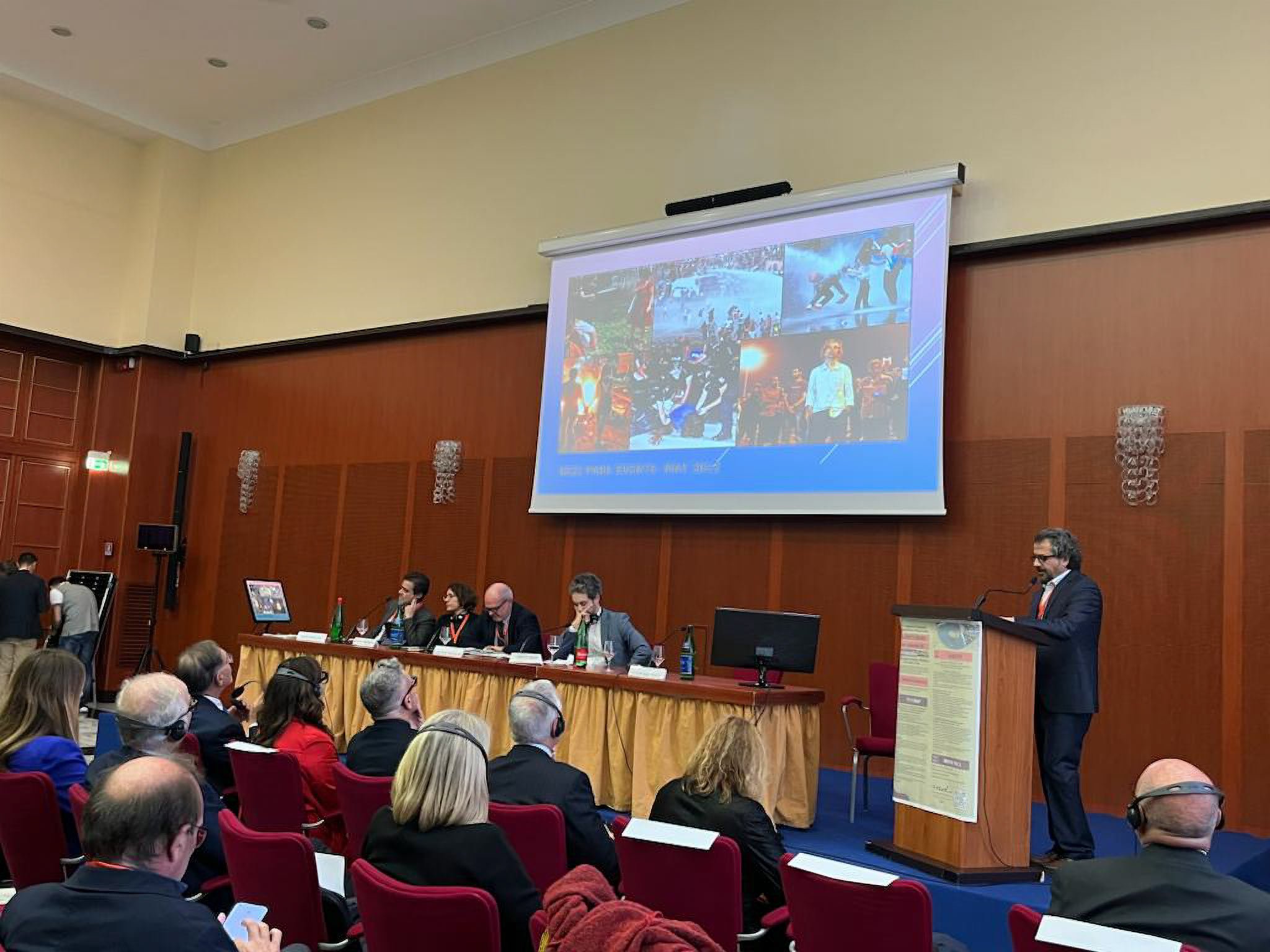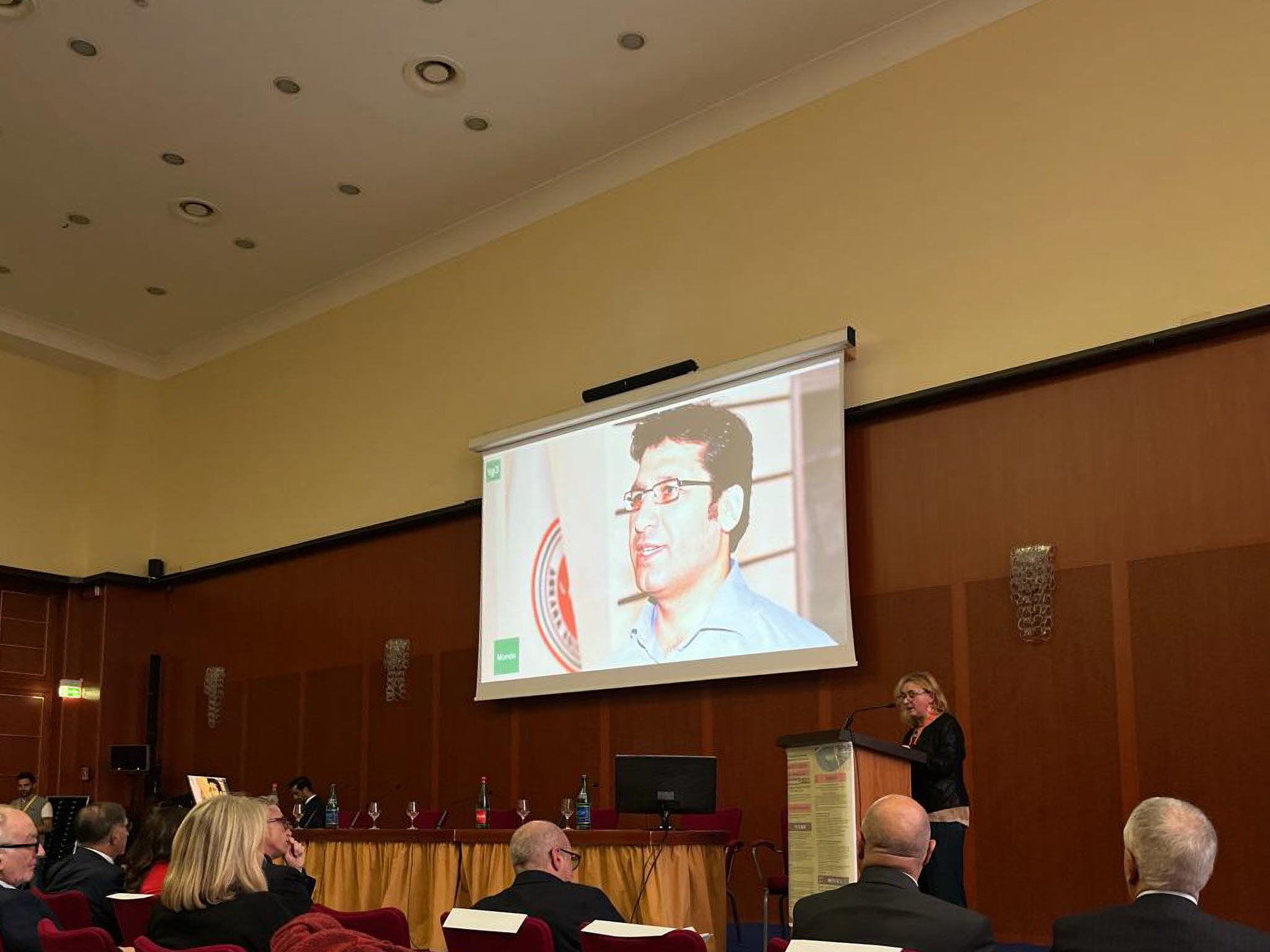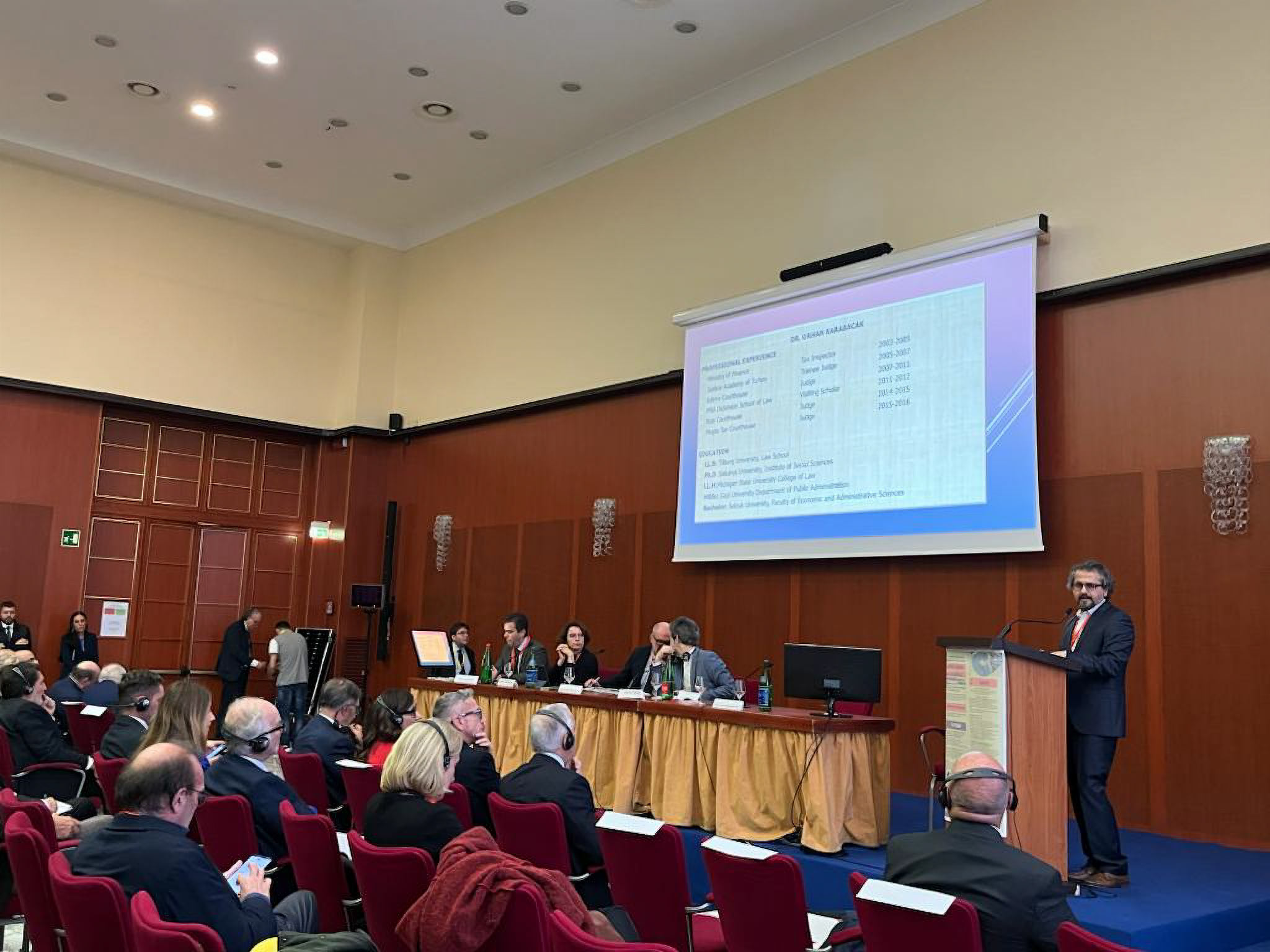MEDEL’s session in the afternoon of November 10 was chaired by Gualtiero Michelini and introduced by Mariarosaria Guglielmi. Monika Frąckowiak, Orhan Karabacak, Vincent Sizaire, Filipe César Marques took the floor on rule of law backsliding, protection of fundamental rights and democracy.
Source: questionegiustizia.it
Democratic backsliding in Europe: the values at stake, the role of judicial associations.
Speech given by Mariarosaria Guglielmi, President of MEDEL – Magistrats Européens pour la Démocratie et les Libertés- at the XXIVth congress of Magistratura democratica.
Naples 10 November 2023
1.MEDEL’s testimony.
MEDEL joins this congress to reiterate its commitment to take a stand in all the situations of crisis and systematic dismantling of the Rule of Law that we are experiencing in Europe.
We will talk about the dramatic events in Turkey that marked the beginning of a dark time for democracy, with the dismissal, persecution, arrest of magistrates, lawyers, human rights defenders, political opponents, journalists.
Events followed by mass trials and summary convictions. We will talk about the non-existence in that country of an impartial and effective judicial guarantee of rights and freedoms; the role assumed by the no longer independent judiciary; the abuse of anti-terrorism legislation in investigations and trials that have become instruments of oppression.
We will talk about Murat Arslan president of YARSAV, a member association of MEDEL that was disbanded by the government immediately after the state of emergency was declared in July 2016.
Detained since October 2016 and sentenced to 10 years’ imprisonment for “participation in a terrorist organization”, in violation of even basic due process guarantees, Murat is the symbol of the most traumatic events MEDEL witnessed in recent years, but also of how strong is the voice, and vivid the presence, of all those who boldly believe in the values of Justice: from Sincan prison, Murat has been a voice and a testimony in this sense and, for MEDEL, the strongest example of the defence of the independence of justice and the values of democracy.
- What we stand to lose.
Over the years, MEDEL has been committed to the defence of the Rule of Law and fundamental rights, and the support to and solidarity with magistrates and their associations under attack.
The experience of MEDEL has made us aware of the risks we can recognize from this unique observatory, which combines a view across Europe, and even beyond its borders, with the experience and knowledge of what is happening in national contexts.
It is through these two perspectives that we can now clearly see the signs of a democratic backsliding and specifically those signs that do not go together with the soldiers in the streets: silent processes of manipulating and hollowing institutions out from within; radical and irreversible changes to the balances which are essential to democracy, carried out by claiming that they are necessary to implement the will of the people expressed in the ballot box, and that they are therefore ultimately democratic.
What became clear from MEDEL’s observatory is that the attack on the independence of the judiciary is always part of a broader project, which includes not only an alteration of the balance of democracy but also a regression in terms of rights and freedoms.
What has become clear is that dissensus over the values of liberal democracy – as Poland and Hungary teach us – is not just a dissensus over its rules, procedures and institutions. It is a dissensus over the very idea of democracy as a form of society based on pluralism and diversity; it is a dissensus over the idea of civil society as participation and collective commitment to rights and freedoms; it is dissensus over the civil society’s right to defend rights.
From MEDEL’s observatory we can see where the process of democratic backsliding reached: independent judicial systems come under attack with structural reforms subverting the rules and capturing the institutions, such as Constitutional Courts and Councils of Justice, and through the delegitimisation of the judiciary.
It is indeed the judicial system that first suffers from the loss of the essential virtues that must characterise the exercise of power and its language in a democracy. These are the virtues that Steven Levitsky and Daniel Ziblatt – in describing how democracies die today – have called ‘mutual tolerance’, ‘institutional forbearance’: resisting the temptation to take control of everything, over the media and free press, over the spaces open to criticism; to dismantle constitutional checks and balances and the institutions that guarantee rights and freedoms.
From MEDEL’s observatory today we see clearly how far this process might take us. What is now shaking are not only the foundations of the European Union, those based on the values written in its founding treaties and its Charter of Fundamental Rights. What is at risk today is the common European space for human rights we created to mark a point of no return with respect to our past of wars and totalitarianism, represented by a system of inalienable values, enshrined in the European Convention on Human Rights.
There are today so many terrible challenges that represent a heavy burden for Europe and its democracy.
Again, a devastating war, a violent breakdown of international legality, and crimes against humanity within its borders.
We have the open challenge launched by countries such as Poland not only to the primacy of European Union law, punishing the judges of that country who continued to act as European judges and to assert this primacy in the dialogue with the EU Court of Justice through the instrument of preliminary ruling. We also have the challenge to the system of the European Convention on Human Rights, launched by a Constitutional Court captured by political power, itself considered by the Strasbourg Court as having been established in violation of Article 6 of the Convention: a Constitutional Court that created an institutional short-circuit and defied the Convention by declaring its principles non-binding and ‘unconstitutional’.
In Turkey we can see an open defiance of the Strasbourg Court’s decisions for arbitrary arrests and detentions. Decisions that confirm the existential risk for the Rule of law in Turkey and for the respect of all human rights guaranteed by the ECHR, posed by the abuse of anti-terrorism legislation, and by investigations and trials carried out by a judiciary that, as stated by the Council of Europe Commissioner for Human Rights, has been at the heart of most human rights violations in Turkey for a very long time, either by failing to rectify violations committed by the Turkish authorities, or by causing these violations directly.
Other challenges are those posed by migration. In MEDEL’s view, migration has always been a decisive challenge for Europe and for democracy. And, today, their survival is linked to our ability to confront a phenomenon that is reshaping the world order, to propose a new narrative, to radically change national and European policies so that they are up to this challenge and, before that, conform to the essential and mandatory standards of protection of the fundamental rights of persons.
What is happening on Europe’s borders calls into question the resilience of our system of values and those that underpin the European Union, enshrined by its Charter and the ECHR: the use of force and ‘legal’ violence at the borders that have been reconstituted within the European Union with walls and barbed wire, implemented with practices of refoulement, with shadow armies in Croatia and Greece, and openly at the Polish border with Belarus; the criminalisation of humanitarian relief work and the obstacles hampering the work of NGOs; the externalisation of border policies and the increasing disregard for the legal constraints that should limit government actions in the field of border control; the disruptive choices of a country like the United Kingdom, one of the first signatories of the ECHR, which, after a swift escalation in the severity of government responses, with the new Illegal Migration Act makes choices that challenge the resilience of the Convention system, violate international legal obligations to protect human rights and encourage the positions of those in that country who call for a withdrawal from the Convention.
- The role of the judiciary and judicial associations.
In this scenario, the challenges for the judiciary appear ever more difficult and terrible: judges and prosecutors, as we have seen in Poland, persecuted with disciplinary actions, removals, transfers; judges and prosecutors who today are confronted – even in our country – with personal attacks -by naming and shaming- for the content of their decisions; instrumental accusations of ‘partiality’ and attempts to seriously de-legitimise their function and their measures because – as in the development we have already experienced with Poland – they operate as European judges, as part of the system of supranational protection of rights based on the Charters and our Constitutions.
Poland’s experience has taught us that in the face of disruptive national choices for the common area of Justice and for the underpinning judicial architecture, the awareness of being European judges has supported the resilience of independent Justice. Against this backdrop, and the attempt to return to an idea of Rule of Law as pure prerogative of national sovereignty, the judgments of the European Courts have reaffirmed its core meaning and the values which are integral part of the very identity of the European Union as a common legal order.
The resilience of individual judges was and is supported by the collective resilience of their associations. Never before has the importance of judicial associationism been so clearly understood.
The visionary and anticipatory idea behind the foundation of MEDEL was the prospect that Justice should take up the challenge for a European democracy; that, by guaranteeing common standards of independence of judicial systems, Justice should be a key actor in the process of European integration based on rights and the Rule of Law, equal dignity of persons and solidarity.
And at the heart of MEDEL’s idea to be realised was the awareness that it cannot be an isolated and lonely judge who faces these challenges. A collective commitment is needed.
Today, this idea of collective commitment is also at risk. From the muzzle law in Poland to the gag amendment in France to accusations of interference in Italy for our Associazione Nazionale Magistrati speaking out on the justice reforms that are being prepared: everywhere there is a a wish to restrict magistrates’ freedom of speech and association.
The experience of Turkey and Poland, however, has led in recent years to a new model of judicial associationism, which has always understood what is at stake and is able to establish a common front; which has demonstrated in its dialogue with the European institutions but also with symbolic events (such as the “March of 1000 Robes” in Warsaw) how strong are the bonds – made of shared values – that today unite judges and prosecutors from different countries within a broader community of jurists and representatives of civil society committed to defending the Rule of Law.
Seeing these experiences growing against the backdrop of such difficult contexts and the gloomy scenarios that dominate Europe today, confirms how far-sighted the vision of MEDEL’s founding fathers was. And how precious is the legacy they left us and which we must preserve today.
You can watch the video of MEDEL session at the conference HERE
Programme:
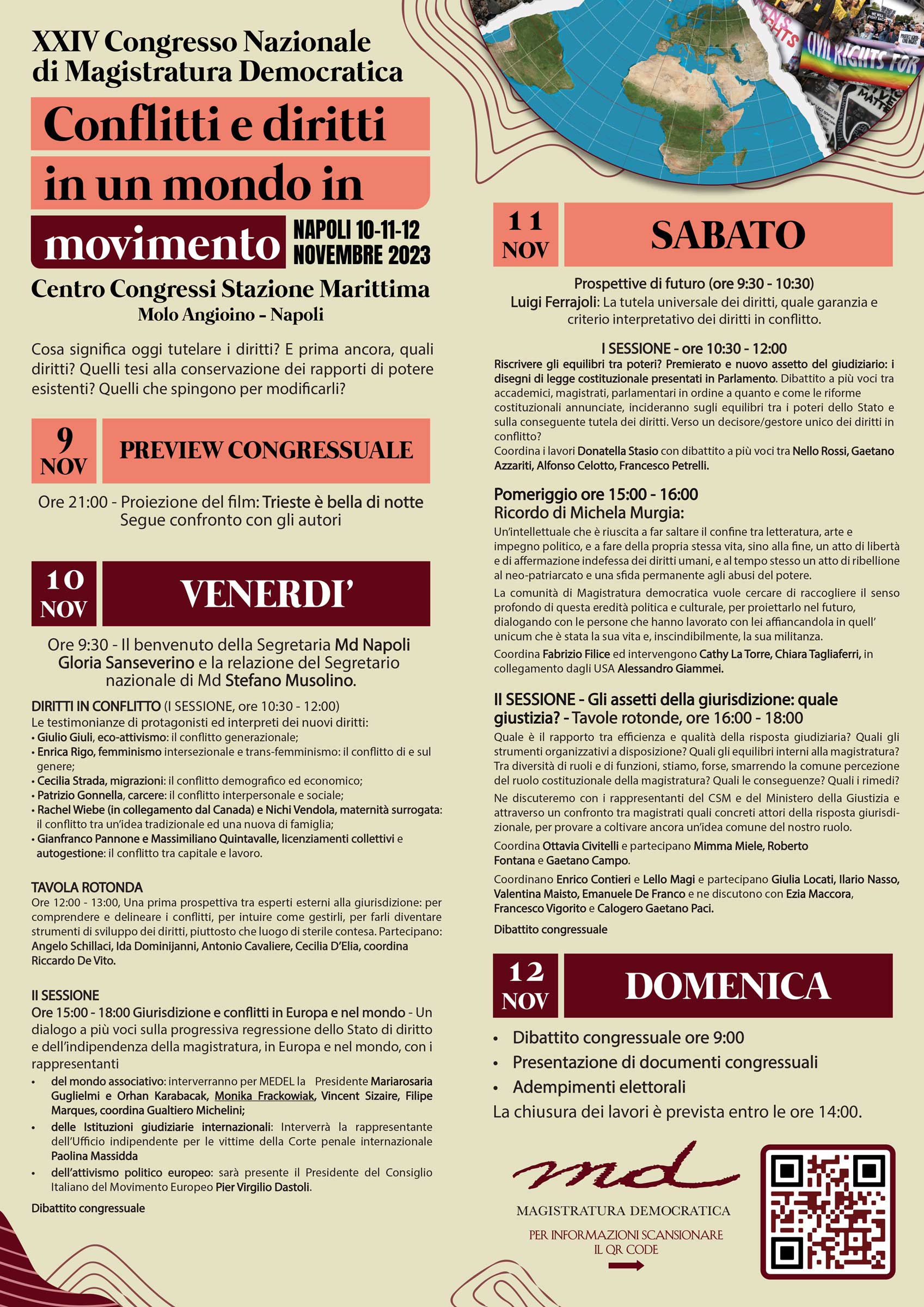
The Italian newspaper la Repubblica published an interview with Mariarosaria Guglielmi on the topics of Medel’s panel in Magistratura Democratica congress, rule of law backsliding in Europe and current developments in Italy


